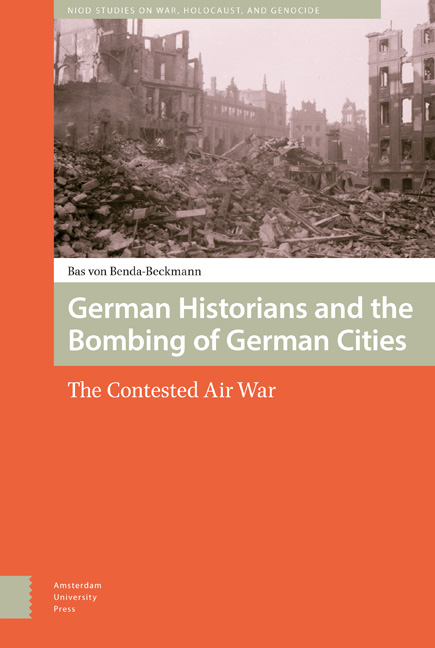Book contents
- Frontmatter
- Contents
- Preface
- Introduction: German Historians and the Allied Bombings
- 1 Putting the Allies on Trial: The Early Federal Republic, 1945-1970
- 2 Dresden and the Cold War: East-West Debates on the Bombing of Dresden, 1945-1970
- 3 A Past Becomes History: The Professionalizing of the Air War Historiography of the Federal Republic
- 4 The ‘Imperialist Air War’: East German historiography and the Work of Olaf Groehler, 1965-1995
- 5 Breaking Taboos: Jörg Friedrich and the ‘Rediscovery’ of the Allied Bombings
- Conclusion: The Contested Air War
- Abbreviations
- Bibliography
- Index
5 - Breaking Taboos: Jörg Friedrich and the ‘Rediscovery’ of the Allied Bombings
Published online by Cambridge University Press: 10 December 2020
- Frontmatter
- Contents
- Preface
- Introduction: German Historians and the Allied Bombings
- 1 Putting the Allies on Trial: The Early Federal Republic, 1945-1970
- 2 Dresden and the Cold War: East-West Debates on the Bombing of Dresden, 1945-1970
- 3 A Past Becomes History: The Professionalizing of the Air War Historiography of the Federal Republic
- 4 The ‘Imperialist Air War’: East German historiography and the Work of Olaf Groehler, 1965-1995
- 5 Breaking Taboos: Jörg Friedrich and the ‘Rediscovery’ of the Allied Bombings
- Conclusion: The Contested Air War
- Abbreviations
- Bibliography
- Index
Summary
With the ending of the Cold War rivalry between East and West Germany an important context for the interpretation of the Allied air war had disappeared. In the new, united Germany, little place was left for the East German interpretations or the anti-Western propaganda that had accompanied it. After 1990, even the more differentiated views of Olaf Groehler were largely ignored by German historians. Though his West German connections had facilitated an academic position for him, the appearance of Groehler's monograph Bombenkrieg gegen Deutschland in 1990 was either ignored or dismissed and associated with the ideologically restricted climate of GDR historiography.
But more generally, important parameters, which had influenced and colored the interpretations of the Allied air war until the late 1980s, disappeared after 1990. On the one hand, the ideological competition between the GDR and the Federal Republic no longer were relevant. On the other hand, the threat of a possible nuclear conflict no longer had political significance for the memory and interpretation of the Allied air war.
The disappearance of the Cold War as a context that could give a contemporary meaning to the Allied bombings did not reduce interest in this issue. On the contrary, during the 1990s, in reunified Germany the destruction of Dresden was increasingly commemorated on a national level and public interest in the air war grew rapidly, especially at the turn of the Millennium. Winfried Sebald's essay Luftkrieg und Literatur (1999) received considerable attention among literary critics and also in press. But the publication of Der Brand (2002) by Jorg Friedrich inspired public interest in the Allied bombings on a previously unseen scale, catalyzing a wave of memory literature, documentaries, and films. Also, the debate following Der Brand generated a new academic interest, both in the history of the air war and in the role the bombing experience had played in German memory culture.
This book and the debate that followed raise different questions. In the first part of this chapter, I will look at Der Brand and analyze the way it interpreted and narrated the Allied bombings. To analyze the elements that made Der Brand into such an appealing and yet very controversial work, means looking into the impact of this work on both the public debate and the renewed academic interest for German suffering during the First World War.
- Type
- Chapter
- Information
- German Historians and the Bombing of German CitiesThe Contested Air War, pp. 199 - 250Publisher: Amsterdam University PressPrint publication year: 2015



